2014 G.A.M.E.S. Campers Discover That Engineering Is Not Just for Boys Anymore
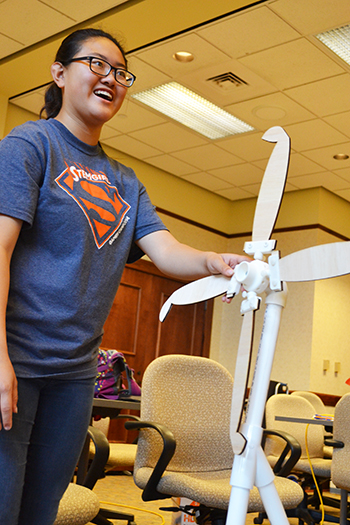
A GBAM G.A.M.E.S. camper adjusts her team's windmill during the competition the final day of camp.
July 21, 2014
The week of July 14–18, 190 high school girls (a record number) converged on the engineering campus for the 2014 edition of G.A.M.E.S. (Girls' Adventures in Mathematics, Engineering, and Science) camp. Offering eight tracks, G.A.M.E.S. not only gave the campers an opportunity to delve into the mysteries of a specific engineering discipline, but also exposed them to female role models at all levels (undergraduate and graduate students, as well as practicing engineers). What's the goal of G.A.M.E.S.? To help girls to discover what Engineering at Illinois is all about, what a career in engineering would be like, and, ultimately, to gain the confidence that they, too, could be engineers.
Down one track from last year (when there were two Computer Science tracks), this year’s eight tracks included: Aerospace, Bioengineering, Chemical Engineering, Computer Science, Environmental Engineering and Sustainability, GBAM (Girls Building Awesome Machines), GLAM (Girls Learn About Materials), and GLEE (Girls Learning Electrical Engineering). However, according to Angie Wolters, Associate Director of Women in Engineering, the camp is more than just the girls learning about an engineering discipline:
“The big part is the girls getting exposure to engineering,” admits Wolters, “but we’re also really using this as an opportunity for them to learn about the breadth of engineering, and then to also learn about the University. It’s a recruiting piece as well.” So camp planners had folks from Admissions do a talk during lunch on Tuesday.
Another important component of the camp was giving the campers female role models. For example, many instructors were female engineering graduate students. Also serving as role models were Illinois undergrad students who served as camp counselors. Wolters says this year the camp also ramped up the involvement of alums and practicing engineers. While campers were concentrating on one engineering discipline throughout the week, at Wednesday’s Engineering Night event, they got more exposure to the other disciplines as graduate students and practicing engineers, mostly women, shared about their work and served as role models to the girls.
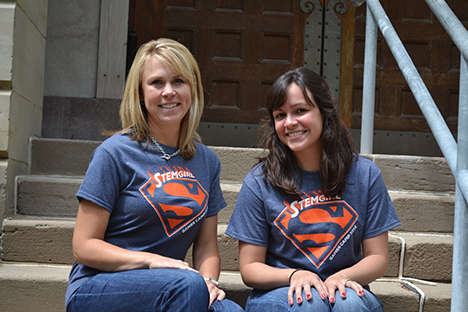
The 2014 G.A.M.E.S. camp administrators Angie Wolters (left) and Sahid Rosado.
Another role model, Sahid Rosado, who was an instructor last year in the Environmental Engineering camp, took on the job of Camp Director this year. “I’m very passionate about education,” she admits, which is reflected in her own educational resume. With a Bachelor’s degree in civil engineering and a Master’s in environmental engineering, Rosado is now working on a Master’s in math education. “I’m very passionate about spreading the word about engineering… So it’s something right up my alley,” she says of G.A.M.E.S., “and it’s something that I’m really passionate about.”
Plus, running G.A.M.E.S. is good practice for what she hopes to do in the future: “I’m from Puerto Rico,” says Rosado, “so I hope to go back home and start some STEM education. We don’t have anything like that at home; so engineering classes for high school girls, that doesn’t even exist.”
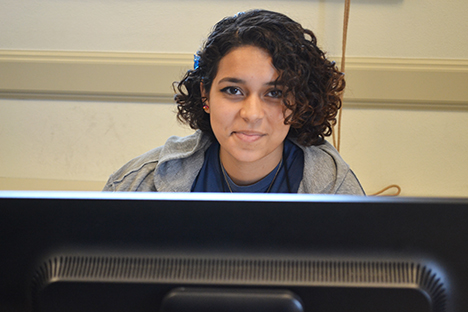
A 2014 GLEE G.A.M.E.S. camper works on an activity about circuits.
And how’s this for a serendipitous coincidence; this year, there was even a camper from Puerto Rico.
Regarding the record number of attendees, Wolters says that they intended to reach as large a number of girls as possible by advertising early...and it worked. This was the first year that all camps were full by the April deadline, and they were able to fill every track.
Wolters, who was in charge of G.A.M.E.S. last year and knows from experience all the hard work that goes into administrating a live-in camp of this size, revels in the record number of campers.
“I think when you look at the work and the effort that goes into running a program like this from the administrative side,” she says, “but also developing and putting together the curriculum, and the teaching of it, it’s sad to see an empty seat there.”
Wolters also indicates that they’re seeing more applications coming in, and the University has the largest class of incoming freshmen coming to the college. Are any of the new incoming freshmen G.A.M.E.S. alumni? Wolters knows of at least two young women who attended GLEE camp who will be incoming freshmen this fall. And according to some of the instructors, there will be even more.
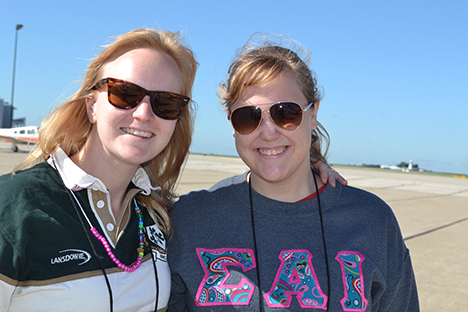
Aerospace Engineering grad student, Laura Richardson, and recent graduate Kailey Draves.
For example, Aerospace Engineering grad student Laura Richardson reports that a few of this year's campers not only participated last year, but are coming to Illinois for college. Working with Aerospace G.A.M.E.S. camp for her second year in a row, Richardson says the camp offers a nice break from grad student duties, plus she enjoys interacting with the girls: "I like seeing how excited girls are who have never seen aerospace stuff and learn about this for the first time. It's really thrilling."
Kailey Draves, who recently graduated with her Bachelor's in Aerospace, was also in her second year helping with G.A.M.E.S. "It's a really cool thing to see girls getting involved in engineering, especially in Aerospace, which is what I've loved and just spent four years doing. So it's a lot of fun sharing that with them."
What impact did the camp have on the girls? Says Draves: "You can see them throughout the week just getting excited about engineering and Aerospace. They start out quiet, but then by the end of the week, they're really excited about what they're learning."
Two Illinois undergrads who served as camp counselors knew just what the girls were going through because they attended G.A.M.E.S. camp themselves when they were younger.
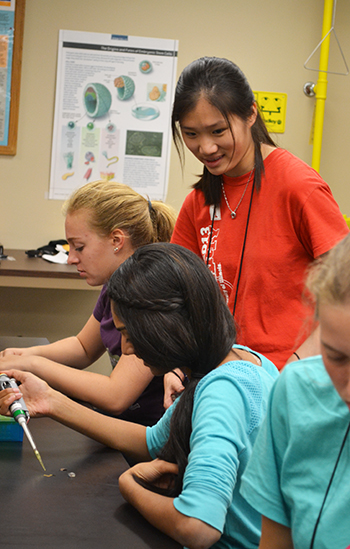
G.A.M.E.S. counselor Claire Tang (right) works with Bioengineering campers during an activity on Stem cells.
For example, Claire Tang, a rising sophomore majoring in molecular cellular biology, attended a G.A.M.E.S. camp called Bioimaging in middle school (before G.A.M.E.S. switched to target highschoolers). Held at the Institute for Genomic Biology, the camp helped girls discover what it was like to do research and how to use lab instruments. “We got to use a lot of the cool instruments they have there,” says Tang, who adds that she also made a research poster about how CO2 affects soybean crops. “It definitely helped spur my interest in science,” she says of the camp, which also evidently spurred her interest in research; Tang wants a career in medical research.
Did attending G.A.M.E.S. impact her decision to attend Illinois? “Definitely,” she says. “But I also live here.” She admits that a lot of “townies” choose Illinois. “It definitely showed me a lot of the cool stuff that Illinois has equipment-wise, for research.” (Plus, attending Illinois runs in the family. Her dad got a Ph.D. from Illinois in Mechanical Engineering.)
What were some of Tang’s responsibilities as camp counselor? “Make sure the girls don’t get in trouble, they’re not getting lost; just making sure they’re enjoying their time here.”
Another responsibility was to sleep in the dorm with the girls. Did she lose a lot of sleep?
“Actually, I have some that go to sleep quite early,” she admits. “It makes my job easier.”
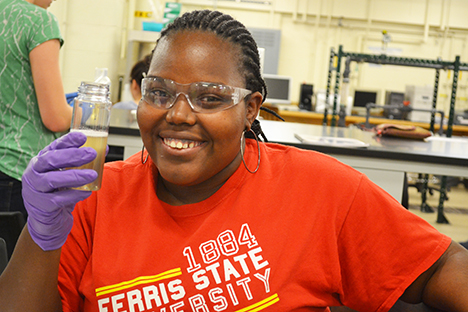
Chemical Engineering G.A.M.E.S. camper working on a hands-on activity making bath bombs.
What was the impact of the camp from her perspective? “A lot of girls come back from class, telling me about their day. And they emphasize what they like from the classes they’ve been to.”
Does Tang think any will attend Illinois? She thinks so: “Yea, there are some that are definitely considering Illinois. It’s a good sign.”
She hopes that another impact is that the campers realize that there are women engineers.
“Definitely just show that science is not a “boy” thing; there are a lot of females in it. And not to be intimidated by science. I think a lot of women are hesitant to start engineering because they don’t feel like they belong, when they really do. There are a lot of women in engineering, so I hope they know that they’re not the only ones that enjoy engineering.”
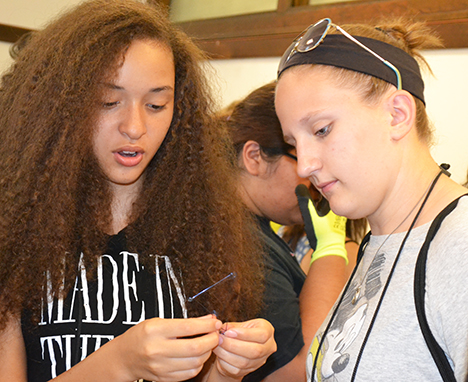
G.A.M.E.S. counselor Grace Pakeltis (right) and a GLAM camper examine material the camper is working with during a hands-on activity about Memory Metals.
Grace Pakeltis, a sophomore in Materials Science, is another ex-camper who was a counselor this year. Pakeltis attended G.A.M.E.S. the summer before her junior year. Since she originally wanted to go into chemical engineering, she applied for that camp, which filled up before she got her application in, so she was relegated to the materials camp.
“I was like, ‘Ok, I’ll try it out,’ indicates Pakeltis. “So I came to camp, and it was sustainable energy, working with solar cells, little solar-powered cars, and stuff like that. And I fell in love with materials science at that camp, and I totally changed my mind about what I wanted to do…When I got accepted here I was super pumped, and I love it.”
Her dream job? Working with alternative energy, specifically hydrogen fuel cells used in cars, such as some made by Rolls Royce, for example.
Why did Pakeltis do G.A.M.E.S. this summer? “I love the message that G.A.M.E.S. has,” she admits. And like Tang, she also says that message is that girls can be engineers.
“I love just showing girls why engineering is awesome, and how we can change the world doing it.”
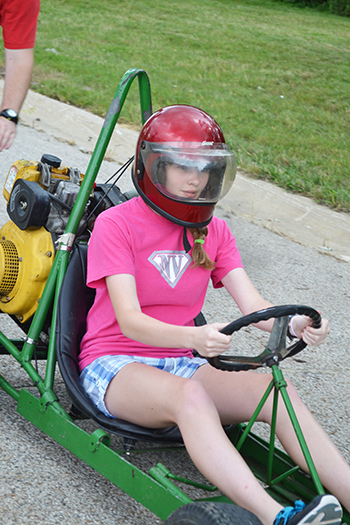
An Environmental Engineering G.A.M.E.S. camper prepares to experience a go-cart powered by an alternative fuel source.
Pakeltis admits that she hopes to increase the number of girls who choose engineering…and Illinois: “A lot of times, the numbers are small for women in engineering, and this university is doing a great job of getting more and more…our numbers are rising. I love being with girls who are passionate about the sciences, and being able to show them new things and everything that they can do on this campus.”
“This camp does a really good job of showing them experiments as well as lectures,” she continues, “so you get the technical and hands-on experience at the same time.”
Pakeltis says counselors are also in charge of the evening activities. For example, on Monday night, they held G.A.M.E.S. Olympics (Minute to Win It); Tuesday was a photo scavenger hunt; and Friday night’s talent show (which has evidently been a hit in the past, because camp admistrators, instructors, counselors, and campers alike were excited about it; rumor has it the GLAM girls did belly dancing.)
Attending G.A.M.E.S. as a high schooler helped Pakeltis choose both her career (Materials Science) and her school (Illinois). She attended three engineering camps, but says G.A.M.E.S. gave campers more hands-on experiences, plus a genuine taste of what college is like. “I love that we got to do complex experiments, we got to see the Clean Room; we got to see the scanning electron microscope; you get to see all these different things that interest you with hands on. I think that this camp does a fabulous job of making it seem like you’re not necessarily a camper; it’s almost like you’re a college student: this is what we do.”
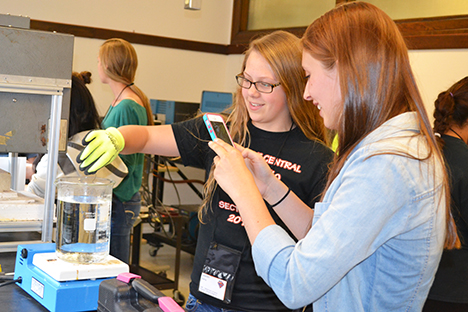
GLAM campers immerse "memory metal" into boiling water to see how it affects the material.
What impact does she hope G.A.M.E.S. has on this year’s crop of campers? “I would love for them to just fall in love with engineering.”
Indicating that she still gets together with friends she made at camp who are on campus, Pakeltis also hopes the girls make some lasting relationships: “Make some friends here that they can continue to talk to throughout their college career…Kind of creating a support group of girls who love engineering, want to change the world. And that’s really what engineers do. We change the world—make it better.”
What impact do G.A.M.E.S. camp leaders hope the camp had? Wolters hopes the girls had such a good time, that they want to come back—as students.
“My hope is always for the girls to come and enjoy their week and be inspired. Hopefully they consider coming back here, if not as a camper again, but as a potential student. That this is someplace that they think that, ‘This was great. I can see myself here as a future student.”
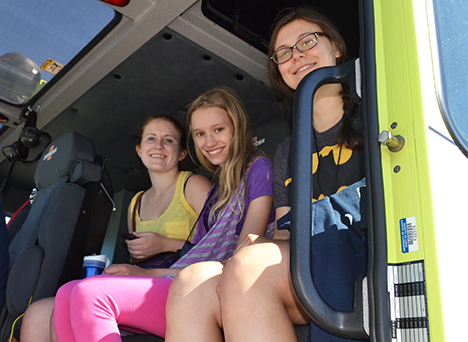
Aerospace campers learn about airplane safety as they get ready for a ride in one of Willard Airport's fire trucks.
Rosado who also wanted the girls to be inspired, also hoped they left with a new self-confidence that they too could be engineers:
“I think it’s very important for the girls to feel not only inspired by the camp, but feel that they can do this. I remember when I was in high school, sometimes I was like, ‘Engineering!’ And I had this vision in my head that’s so wrong. So to me, it’s to be inspired by engineering, but also not be intimidated by being an engineer, or even any STEM, actually, not just engineering. I would love for them to leave here and say, ‘I can do this. This is something that I can do.”
Story and photographs by Elizabeth Innes, Communications Specialist, I-STEM Education Initiative.
More: 8-12 Outreach, GAMES, GAMES: Summary, Summer Camp, Women in STEM, 2014
For additional istem articles on G.A.M.E.S. camp, please see:
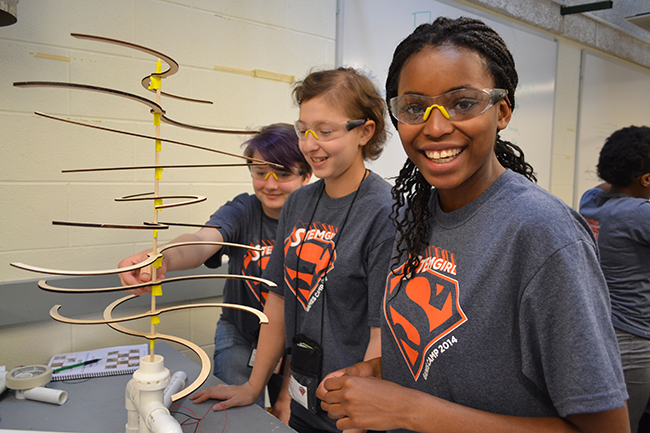
Some 2014 GBAM campers work on their design for the windmill competition.













.jpg)
















